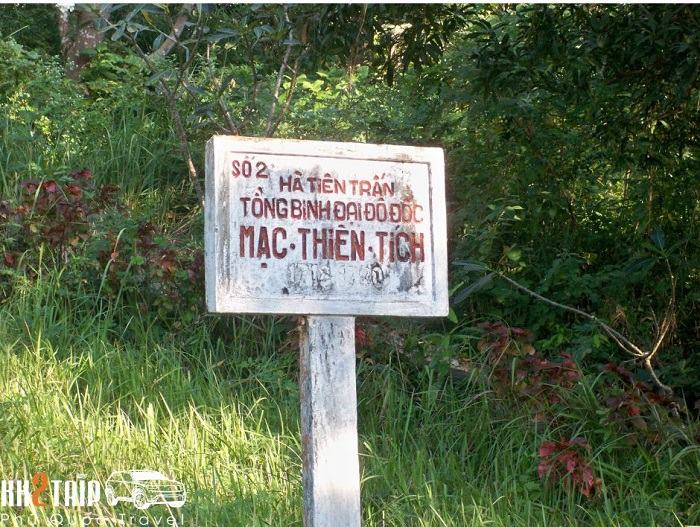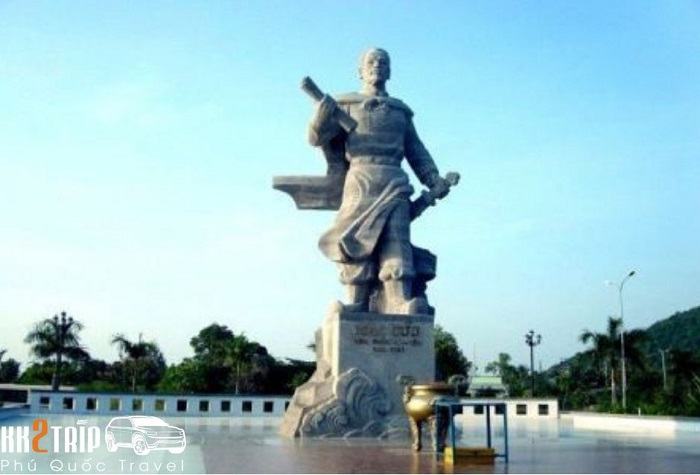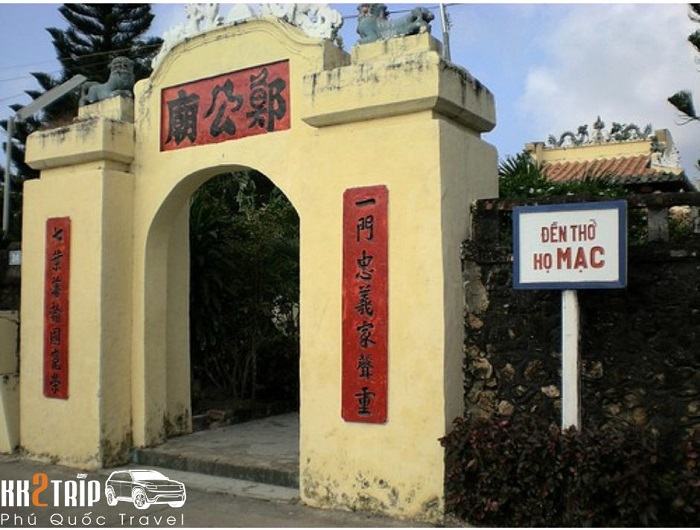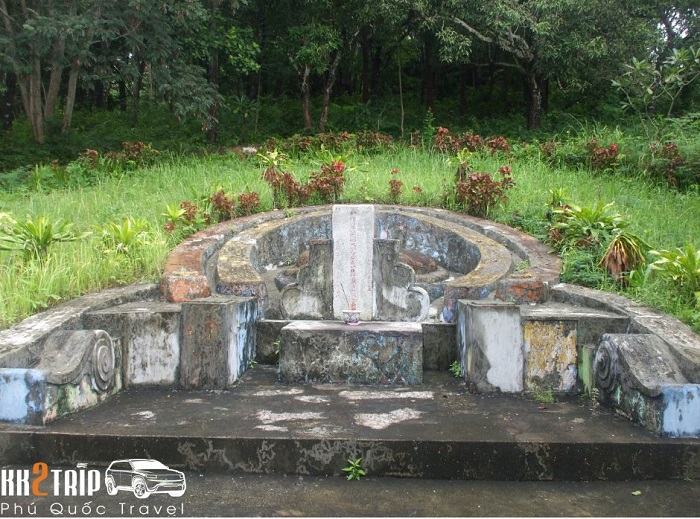Mac Thien Tu, also known as Mac Thien Tich (1718-1780), was a renowned mandarin and scholar during the Nguyen Lords’ era. He was the eldest son of General Mac Cuu, who was bestowed the title of Tong Duc Hau by the Nguyen Lords and is credited with pioneering the development of Phu Quoc Island, Vietnam.
The Establishment of Ha Tien Town Under Mac Cuu

During the southward expansion of Vietnamese territory, Tran Thuong Xuyen, Duong Ngan Dich, and Mac Cuu were three prominent Minh Huong figures who significantly contributed to the Nguyen Lords’ efforts in developing and pacifying the regions of Dong Nai, Gia Dinh, and the Mekong Delta. Over 300 years ago, Ha Tien was a desolate land with dense jungles, mysterious mountains, and dangerous wildlife. The formation and development of Ha Tien are intertwined with the rise and fall of the Mac family, who played a crucial role in gathering people to cultivate and expand this land, earning the respect of many. Ha Tien was once a bustling trading port, surpassing several Southeast Asian countries in development with its thriving economy, well-organized military, and unique culture. Mac Thien Tich in Ha Tien’s History Leading the development of Ha Tien was Mac Cuu (1655 – 1735), born in Le Quach village, Hai Khang district, Lei Zhou, Guangdong province, China. He was a Ming Dynasty subject, skilled in both economics and military affairs. After the fall of the Ming Dynasty and the rise of the Qing Dynasty, dissatisfied with the early Qing policies, he and his family crossed the East Sea to the South. After a period of wandering, trading, and conducting business in Southeast Asian countries around the Gulf of Thailand, he settled in Ha Tien. At that time, Ha Tien was desolate and unadministered, with a sparse population of Kinh, Hoa, and Khmer people scattered on high ground. With the vision of a strategist, he recognized the strategic location of Ha Tien near the mountains and coast, ideal for establishing his enterprise. He gathered people and established the first seven villages: Ha Tien, Vung Thom, Rach Gia, Can Vot, Trung Ke, Phu Quoc, and Ca Mau. He provided farming tools, taught people how to cultivate and raise livestock, and organized trade with foreign merchants. Soon, Ha Tien became more populated and prosperous. Under Mac Cuu’s governance, Ha Tien quickly became a bustling and renowned trading port in the Gulf of Thailand and neighboring countries. This prosperity attracted the attention of Siam (present-day Thailand), which attempted to conquer it several times. Recognizing the need for a powerful ally, Mac Cuu sought the support of the Nguyen Lords, whose influence was gradually extending to Dong Nai, Gia Dinh, and My Tho. In 1708, Mac Cuu sent envoys with tributes to Phu Xuan, pledging allegiance to the Nguyen Lords and requesting the incorporation of Ha Tien into the territory of Dai Viet. Nguyen Lord Phuc Chu accepted this request and appointed Mac Cuu as the General of Ha Tien Town. From then on, the region was officially renamed Ha Tien Town, marking its integration into Dai Viet. Mac Cuu ruled Ha Tien Town until his death in 1735 at the age of 80. His eldest son, Mac Thien Tich (1718 – 1780), succeeded him, further developing Ha Tien and being appointed General and Grand Admiral by the Nguyen Lords. He continued the pioneering work in Southwest Vietnam, transforming Ha Tien into a prosperous and culturally rich region, and repeatedly repelling invasions from neighboring Siam and Cambodia.
The Significant Contributions of Mac Thien Tich
Territorial Expansion


In 1739, the Cambodian King Nac Bon (or Nak Boun) attacked Ha Tien. Mac Thien Tu commanded his troops to fight day and night. His wife, Nguyen Thi Hieu Tuc, rallied the wives of the soldiers to transport equipment and food to the front lines. After repelling the invaders, the Mac family was praised by the Nguyen Lords, and Mac Thien Tu was specially appointed as Admiral General, receiving a red robe, hat, and belt. His wife was also honored with the title of Lady (Hieu Tuc Thai Phu Nhan). Mac Thien Tich – A Phu Quoc Historical Figure In 1747, pirate Duc Bung’s raid on the coastal area of Long Xuyen was also repelled by Mac Thien Tu’s forces. In 1756, the Cambodian King Nac Nguyen threatened the Con Man people (Cham people who migrated to Cambodia) but was defeated by General Nguyen Cu Trinh and fled to Ha Tien to seek refuge with the Mac family. Mac Thien Tich sent a letter to the Nguyen Lord, stating that Nac Nguyen intended to offer the lands of Tam Bon and Loi Lap as atonement. The Nguyen Lord agreed and sent an escort to accompany Nac Nguyen back to his country. These two regions later became the prefectures of Go Cong and Tan An. In 1757, after Nac Nguyen’s death, his uncle, Nac Nhuan, who had long desired the Cambodian throne, offered the two regions of Preah Trapeang and Basac (Tra Vinh and Ba Thac). However, Nac Nhuan was killed by his son-in-law, who usurped the throne. Nac Nhuan’s son, Nac Ton, fled to Ha Tien for help. Mac Thien Tich intervened, requesting the Nguyen Lord to recognize Nac Ton as the King of Cambodia. The Nguyen Lord agreed and ordered Mac Thien Tich and his soldiers to escort Nac Ton back to his country. Mac Thien Tich – Key Figure in Phu Quoc’s History In gratitude, Nac Ton offered Tam Phong Long (the land between the Tien and Hau Rivers) to the Nguyen Lord. To the Mac family, Nac Ton offered the five prefectures of Can Bot, Truc Sam, Huong Uc, Sai Mat, and Linh Quynh. Mac Thien Tich dedicated all this land to the Nguyen Lord, who then incorporated it into Ha Tien Town and entrusted its administration to the Mac family. Mac Thien Tich divided the land into two regions: Rach Gia (Kien Giang) and Ca Mau (Long Xuyen), appointing officials and establishing villages. From 1775 to 1777, Mac Thien Tich, along with his sons Mac Tu Dung, Mac Tu Hoang, and Mac Tu Thang (or Thuong), assisted Nguyen Lord Phuc Thuan in defending and developing Tran Giang (present-day Can Tho).
Economic Development
Upon assuming his responsibilities, Thien Tu (Thien Tich) revitalized the economy, transforming Ha Tien into a prosperous and affluent port, demonstrating his exceptional leadership.
Contribution to Literature

Along with Tran Tri Khai, also known as Hoai Thuy, a renowned scholar from Viet Dong (China), Mac Thien Tu successfully established the Chieu Anh Cac poetry club in Ha Tien in 1736. Until 1771, this club contributed significantly to Vietnamese literature with valuable works such as “Ha Tien Thap Canh,” “Ha Tien Thap Canh Khuc Vinh,” “Thu Duc Hien Tu Canh,” and “Minh Bot Di Ngu.” Mac Thien Tich – A Legend in Phu Quoc History From then until now, despite numerous historical upheavals, Ha Tien still evokes nostalgia for the pioneering era of the Mac family and the Vietnamese people in this new land, fostering a deeper appreciation for every part of the homeland. Besides exploring its history, Ha Tien offers many captivating destinations. When visiting Ha Tien & Phu Quoc, let KK2TRIP be your travel companion. KK2TRIP is a reputable provider of tourist vehicle rental services in Phu Quoc, trusted by many customers. KK2TRIP offers a wide range of car rental services, including daily, kilometer-based, monthly, long-term contract, airport transfer, with or without driver, to meet diverse travel needs in Phu Quoc. Contact us for consultation and support. KK2TRIP CO., LTD – Address: 118 Tran Hung Dao Street, Phu Quoc
- Hotline: 0816 667 118
- Email: nguyennam1994pq@gmail.com
- Website: kk2trip.com


 Tiếng Việt
Tiếng Việt